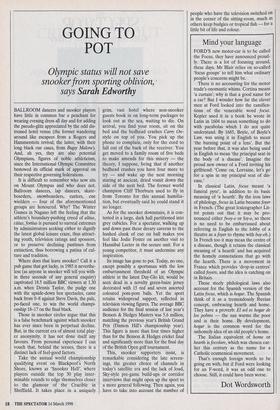Mind your language FORD'S new motor-car is to be called
the Focus, they have announced proud- ly. There is a lot of focusing around, these days. Mr Blair relies on so-called `focus groups' to tell him what ordinary people's concerns might be.
There is no accounting for the motor trade's onomastic whims. Cortina means `a curtain'; why is that a good name for a car? But I wonder how far the clever men at Ford looked into the ramifica- tions of the venerable word focus. Kepler used it in a book he wrote in Latin in 1604 to mean something to do with parabolas which I do not quite understand. By 1685, Boyle, of Boyle's Law, was using it in English to mean `the burning point of a lens'. But the year before that, it was also being used in English to mean 'the principal seat in the body of a disease'. Imagine the proud new owner of a Ford inviting his girlfriend: 'Come on, Lorraine, let's go for a spin in my principal seat of dis- ease.'
In classical Latin, focus meant 'a funeral pyre', in addition to its basic meaning of 'a hearth'. By the iron laws of philology, focus in Latin became foyer in French. (The great lexicographer Lit- tit points out that it may be pro- nounced either fwoy-e or foy-e, so there is no need to be embarrassed about referring in English to the lobby of a theatre as a foyer to rhyme with boy-eh.) In French too it may mean the centre of a disease, though it retains the classical meaning of 'a hearth' and has acquired the homely connotations that go with the hearth. There is a movement in France which provides `drop-in centres' called foyers, and the idea is catching on in Britain.
Those steely philological laws also account for the Spanish version of the Latin focus, which is hogar. The Spanish think of it as a tremendously Iberian concept, embracing hearth and home. They have a proverb: El sal es hogar de los pobres — the sun warms the poor and is their home. By development, hogar is the common word for the unhomely idea of an old people's home.
The Italian equivalent of home or hearth is focolare, which was chosen ear- lier this century as the name for a Catholic ecumenical movement.
That's enough foreign words to be going on with, but if Ford were looking for an F-word, it was an odd one to choose. Still, it could have been worse.
Dot Wordsworth


































































 Previous page
Previous page